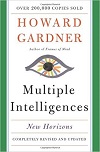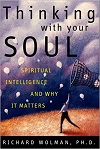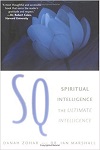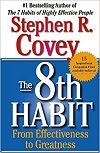|
TRANSLATE THIS ARTICLE
Integral World: Exploring Theories of Everything
An independent forum for a critical discussion of the integral philosophy of Ken Wilber
 Since 1990 Gary Stogsdill has been a faculty member at Prescott College where he currently teaches courses in humanistic mathematics, science appreciation, and wisdom studies. He has a blog called "Pursuing Wisdom Now", which features articles on contemporary spirituality. Since 1990 Gary Stogsdill has been a faculty member at Prescott College where he currently teaches courses in humanistic mathematics, science appreciation, and wisdom studies. He has a blog called "Pursuing Wisdom Now", which features articles on contemporary spirituality.
SEE MORE ESSAYS WRITTEN BY GARY STOGSDILL Do You Think You're Smarter than Buddha?Thoughts on Spiritual IntelligenceGary StogsdillIntroduction
I find Ken Wilber's understanding of the very concept of spiritual intelligence itself to be seriously limited.
In earlier essays for Integral World, I have critiqued the perennialist model of spirituality, prompting one reader to dismiss me with, “Do you think you're smarter than Buddha?” I enjoyed that zinger a great deal and used it as a koan for several days. This essay is my reflection on that question. Yes, actually, I suspect that I, along with almost everyone else on the planet, am smarter than Buddha in some ways. For me, mathematics is probably a safe bet of one intelligence where I'm smarter than the Enlightened One. All of us consist of many different intelligences, and no one, not even the spiritual giants, are good in all of them. In fact, the presence of genius in one intelligence almost guarantees a significant lack in one or more of the other ways that humans can express intelligence. This becomes apparent when we closely study the lives of geniuses in art, music, literature, science, mathematics, athletics, sainthood, and spiritual panditry. Of course, my reader-friend was not wondering how Buddha and I would compare on a mathematical aptitude test, but rather something like this: “Do you think you have greater spiritual intelligence than Buddha?” And I'm pretty sure my friend wasn't really asking a question to be contemplated and answered at all. What was really meant is that I as an ordinary mortal have no business expressing any thoughts about spirituality that differ from the greats like Buddha or Ken Wilber because anything that contradicts such ultimate wisdom would be laughably wrong. This is spiritual fundamentalism and an obstacle to human development. We need all manner of humans to be exploring and commenting upon the noble pursuits that define our humanity, including spirituality. And when individual experience or deeply held knowledge differs from the teachings of the great ones, we especially need to hear that. I suspect that most readers of Integral World understand this; after all, it's at least partly why we read Integral World. However, I appreciate my reader-friend's rhetorical question because it motivated me to not just contemplate my own understanding but also investigate how others view spiritual intelligence. This essay first explores what pioneering thinkers have to say about spiritual intelligence, followed by my own understanding, followed by an evaluation of Ken Wilber's thoughts on spiritual intelligence, and then back to the Buddha for a discussion of my reader-friend's literal question.
What is Spiritual Intelligence?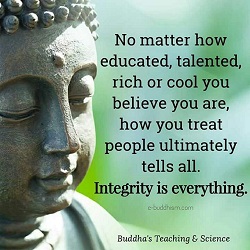
Harvard professor Howard Gardner has championed the idea of multiple intelligences for more than 35 years. Originally he designated seven intelligences that all humans can express: logical-mathematical, linguistic, musical, bodily-kinesthetic, spatial, interpersonal, and intrapersonal (Frames of Mind, 1983). Later Gardner added naturalistic intelligence and considered spiritual intelligence but declined to add this as an official designation because 1) he doesn't believe “that an intelligence should be confounded with an individual's phenomenological experience,” and 2) he is uncomfortable that many individuals associate the word spiritual with “a belief in religion and God” (Multiple Intelligences: New Horizons, 2006, p. 20). Gardner did recognize the value of something related to spiritual intelligence, which he named existential intelligence. Here's how Gardner describes existential intelligence: “This candidate intelligence is based on the human proclivity to ponder the most fundamental questions of existence….These are questions that…concern issues that are too big or too small to be perceived by our five principal sensory systems” (Multiple Intelligences: New Horizons, 2006, p. 20). However, Gardner did not believe that existential intelligence qualifies for equal status to the other eight intelligences, and humorously referred to it as half of an intelligence. It should also be noted that Gardner considers morality or ethics to be more important than any of the intelligences that he has identified: “The challenge for society in the future is not simply to produce individuals who are intelligent….Rather, it is to yoke our intellectual capacities to a sense of ethical responsibility” (p. 240). Meanwhile, Gardner's colleague at Harvard, Richard Wolman, argued in favor of a full-blown spiritual intelligence and even did what psychologists do the best: created a test to measure it, the PsychoMatrix Spirituality Inventory (PSI). Wolman's 2001 book Thinking with Your Soul: Spiritual Intelligence and Why it Matters presents his PSI test and describes spiritual intelligence as:
In my view, Wolman has vastly improved on Gardner's thoughts about existential intelligence by adding the obvious role of spiritual intelligence in how we live our daily lives, how we experience the world around us, and how we relate to others through ethical behavior. While Wolman was developing his PSI test, author and professor Danah Zohar began to refer to spiritual intelligence. In 2000 she along with her husband, Dr. Ian Marshall, published SQ: Connecting with Our Spiritual Intelligence, where the abbreviation SQ denotes spiritual quotient as in IQ for intelligence quotient and EQ for emotional quotient. According to Zohar and Marshall, “the indications of a highly developed SQ include:
I question whether field independence, holism, and flexibility—although certainly valuable traits—are necessarily connected to spiritual intelligence. But I believe Zohar and Marshall have enlarged our understanding of spiritual intelligence by adding the new elements of “self-awareness” and “the capacity to deal with suffering.” They have also reinforced Wolman's focus on ethical behavior by the traits “reluctance to cause harm” and “being inspired by values,” and by devoting an entire chapter to emphasizing the importance of ethics in spiritual intelligence. Finally, best-selling inspirational author Stephen Covey extolled spiritual intelligence as “the central and most fundamental of all the intelligences” (The 8th Habit: From Effectiveness to Greatness, 2004, p. 53) and offered three ways to develop spiritual intelligence: “first, integrity—being true to one's highest values, convictions and conscience, and having a connection with the Infinite; second, meaning—having a sense of contribution to people and to causes; and third, voice—aligning our work with our unique talents or gifts, and our sense of calling” (pp. 348, 349). Covey's understanding of spiritual intelligence serves to reinforce Wolman's emphasis on how we live our daily lives and how we relate to others. In addition, Covey's utmost respect for ethical behavior is made apparent by the fact that he considers the highest manifestation of spiritual intelligence to be conscience, which he defines as “the inward moral sense of what is right and what is wrong” (p. 66).
My Understanding of Spiritual IntelligenceFirst, I need to clarify what I mean by the word intelligence. Most definitions of this word are skewed toward rational intellect, which is the ability to process, categorize, patternize, systematize, compare, contrast, analyze, synthesize, and evaluate information. This is what IQ tests measure, and this is why Howard Gardner has worked tirelessly for the last 35 years to help us understand that there exist multiple intelligences, not just the kind that give us a high IQ score and an inflated ego. This is also why otherwise smart people can believe that animals don't have intelligence: because the IQ version of intelligence that humans have created is made in our own image and shortsighted. What I mean by the word intelligence is the capacity to make sense of things and thereby function well. All living beings have this capacity to some extent because it begins with a sense of self as distinct from not-self. Even bacteria are able to make sense of things to an extent that allows them to function remarkably well. Humans have certainly developed intelligence in specific and wonderful ways, as have other animals, and one of the ways for humans is spiritual intelligence. Spiritual intelligence, for me, rests on the foundational ability to cultivate meaning and purpose by relating to a deeper reality than what is revealed by science and rational thought. Most of the previously mentioned thinkers include meaning and/or purpose in their discussion of spiritual intelligence, but it's important to specify what kind of meaning and purpose. In their most grotesque forms, meaning and purpose might be cultivated by a serial killer. At a more benign level, meaning and purpose are found in most of the pursuits that define human lives: love, work, hobbies, sports, and so on. Spiritual intelligence looks for meaning and purpose in the ultimate mysteries of our existence. I believe that spiritual intelligence will further include the following expressions:
For me spiritual intelligence begins with mystery and wonder, and ends with being the best humans we can be for the good of the greater whole. Unlike IQ, spiritual intelligence cannot be confined to an individual person and his or her mind, but instead exists in relationship to others and to larger realities.
Integral Spiritual IntelligenceIntegral theorist Ken Wilber acknowledges multiple intelligences and offers his most up-to-date views about spiritual intelligence in the 800-page tome The Religion of Tomorrow (2017). Here Wilber introduces spiritual intelligence by distinguishing between two ways of approaching spirituality:
“Humans then have two very different types of spiritual engagement possible for them. The first is a direct, immediate 'experience'—via 1st-person states of consciousness—of spiritual realities….This is the spirituality of WAKING UP….The second major type of spiritual engagement is, on the other hand, simply a set of narratives, a series of stories and tales, often magic or mythic, purporting to explain the relation of the human and the Divine. [This second type of spiritual engagement] concerns…what we think or feel about the Divine. It concerns not our spiritual experiences…but our spiritual intelligence…“ (p. 58).
Wilber goes on to declare that
“the disaster of modern Western religion or spirituality is…[partly that] it has been involved with spiritual intelligence and thus what one must believe (not what one must experience) in order to be saved…“ (p. 60).
I find a number of problems with Wilber's understanding of spiritual intelligence. The first is that Wilber categorizes spiritual intelligence in his integral system as a line of development, yet he introduces spiritual intelligence by linking it to lower stages of conscious, by calling it simply stories and tales, and by equating it with what we merely think, feel, or believe. Although Wilber does offer a token nod that both types of engagement with spirituality are “incredibly important” (p. 59), he makes it very clear to the reader that one type (experiencing altered states of consciousness) is vastly superior to the other type (spiritual intelligence). When a writer introduces a concept, the first exposure is usually what makes the most lasting impression on a reader, and it also usually reveals how the writer feels about this particular concept. In this case readers are led by the hand to a condescending view of spiritual intelligence from the beginning, and one can assume that this is Wilber's view as well. A more concerning problem is Wilber's suggestion that there are only two ways to approach spirituality, one being our experience of altered states of consciousness and the other being merely thinking about spirituality (spiritual intelligence). That's it? Nothing more than these two exercises of the mind? What has happened to the vast majority of the ways we can express spirituality in our everyday lives? Where is Wolman's understanding that spiritual intelligence involves “connections between each of us and the world in which we live”? Where are Wolman's and Covey's emphases on how we live our daily lives and how we relate to others? Where is the understanding of Wolman, Zohar, Covey, and myself that ethical behavior is vitally connected with spiritual intelligence? I believe this problem may reveal one of the downsides of creating an all-encompassing intellectual system like Wilber's integral theory: everything has to be made to fit into the compartments of the system. This causes real and important things, like spirituality and spiritual intelligence, to get squished. In this case, spiritual intelligence is so squished as to be hardly recognizable after our previous discussion of Wolman, Zohar, Covey, and myself. Another problem is Wilber's further statement that “spiritual intelligence…is less experiential and more intellectual“ than altered states of consciousness (p. 197). I suppose we can make a case for this given Wilber's paltry definition of spiritual intelligence as merely thinking about spiritual stuff, but the states of consciousness Wilber is referring to also take place inside of one's mind. At Prescott College where I teach, we emphasize experiential learning. That does not mean going deeper inside of one's own mind, but rather getting out of our head, out of the grand intellectual theories, and out of the classroom into real-life situations. Most of what the previous thinkers describe as spiritual intelligence is truly experiential and in no way resembles the altered states of mind that Wilber extolls. A final problem with Wilber's understanding of spiritual intelligence is that he completely separates morality from spiritual intelligence. He discusses moral intelligence in The Religion of Tomorrow, but finds no common ground between that and spiritual intelligence. Further, the following comment from Wilber suggests that morality is of little concern to Wilber or to others who are highly evolved:
“Waking Up is Waking Up—when you discover your True Nature, or ultimate Reality, or pure Nondual Suchness, or radical Godhead, who cares what your 'relative self' is like…” (p. 9).
Who cares what your relative self is like? Every other living being on the planet who wants to flourish will care what your relative self is like because if your relative self is not being the best self it can be, that will likely cause harm to others. The very basis of ethics is caring about the behavior of our relative self. Wilber refers to himself as a pandit. This Sanskrit word originally meant a wise scholar of the Vedas and has come to mean someone of great spiritual intelligence who is able to insightfully explain subtle spiritual truths. Many would agree with Wilber's self-assessment and call him one of the most spiritually intelligent people alive today. Yet for the reasons discussed above, I find Wilber's understanding of the very concept of spiritual intelligence itself to be seriously limited.
Back to the BuddhaAt this point it might be helpful for us to address my reader-friend's literal question regarding Buddha. Please know that I value great teachers like Buddha and respect those who endeavor to lead spiritual lives, as do Buddhists and others who are inspired by Buddha. The following is simply my attempt to bring our discussion of spiritual intelligence full circle by evaluating concrete actions as opposed to what goes on inside of minds. As most readers will know, the young Siddhartha Gautama was so disturbed by discovering the existential realities of human suffering and death that he abandoned his wife and infant son to try to find personal release from his angst. Eventually, after many years of dedicated spiritual seeking that included extreme austerities, he became the Enlightened One, the Buddha, and the rest is history. How spiritually intelligent were these actions? According to Wolman, these actions would completely miss what spiritual intelligence is largely about: moral choice based on relationship as opposed to individualism and personal needs. According to Zohar and Marshall, the young Buddha would score high marks for being field independent and for having a high degree of self-awareness of his existential angst. However, his actions would completely fail regarding the ability to face and use suffering and the injunction against causing unnecessary harm (to himself during his extreme austerities). According to Covey, the young Buddha would be seriously lacking in what Covey considers the highest manifestation of spiritual intelligence: a conscience that understands our ethical obligations in relationship to others. According to my own understanding, the young Buddha's journey was not about expressing spiritual intelligence at all, but rather about personal release from suffering. There was no interest in the mysteries of existence, no wonder and awe, no relationship with deeper reality, no endeavor to realize a full human potential, and no endeavor to express the best ethical behavior. Granted, his teachings after becoming the Enlightened One included some of these factors, but his own journey toward enlightenment was consistent with what I have observed in many contemporary perennialists: all about my own enlightenment no matter what. According to perennialism, and I suspect Wilber, where the purpose of the universe and life is enlightenment for individual humans, the young Buddha's actions are not just spiritually intelligent; they are pure genius. It doesn't get any better than this. Wives and children cannot be allowed to stand between a man and his personal need for enlightenment. We go straight for the jugular and get awakened. In fairness to all the good perennialists out there, I'm sure they would take exception to this assessment and instead talk more in terms of enlightenment being the supreme ethic that takes precedence over all other ethical considerations, or they would suggest that the realm of ethical behavior is less real or even unreal compared to high spiritual states of consciousness. Or they would just say it bluntly like Ken Wilber:
“Waking Up is Waking Up—when you discover your True Nature, or ultimate Reality, or pure Nondual Suchness, or radical Godhead, who cares what your 'relative self' is like….”
I have a close perennialist friend, a dedicated nondualist of many decades, so I asked him recently how he would define spiritual intelligence. He responded, “Spiritual intelligence is knowing what you are not.” In the spirit of the great Ramana Maharshi, nondualists tend to be pithy, so I prodded him to elaborate and got this: “Spiritual intelligence is knowing that nothing of this world is real, and that you and I don't really exist.” We happened to be enjoying a live soccer match at the time, so I asked, “How would any of these soccer players be able to play so well if they understood that nothing is real?” He thought for a moment and said, “They probably wouldn't be able to play at all; that's why the enlightened ones withdraw from this world.” We didn't take our conversation further because the soccer match got really interesting. (Even nondualists cannot resist becoming engrossed in soccer when their team is playing a great game.) However, the logical extension of this conversation is that once we become enlightened, or even while we're underway toward enlightenment, we have no use for this world because we understand that nothing is real. Where is the need for ethics and for caring about our larger community with an understanding like this? I know that perennialists as well as integral theorists and students will avidly affirm that the nature of enlightenment, or even the nature of being on the path to enlightenment, causes us to actually become more ethical than ordinary folks. For example, Roger Walsh and Frances Vaughan assert, “After transpersonal maturation occurs, ethical behavior is said to flow spontaneously as a natural expression of identification with all people and all life” (Paths Beyond Ego, 1993, p. 48). However, for 24 years I spent time with those who had supposedly achieved transpersonal maturation, and I saw no evidence of the spontaneous flow of ethical behavior. In fact, I saw contrary evidence in some cases, and Geoffrey Falk's exhaustive study, Stripping the Gurus: Sex, Violence, Abuse and Enlightenment (2005), reveals this lack of ethical behavior to be the norm, not the exception, among the cream of the crop of the transpersonally mature. Perhaps this fact confirms the unfortunate accuracy of Wilber's quip:
“Waking Up is Waking Up—when you discover your True Nature, or ultimate Reality, or pure Nondual Suchness, or radical Godhead, who cares what your 'relative self' is like….”
We should all care what our relative self is like. I would not call it spiritual intelligence to abandon one's wife and child for a self-serving goal, and neither would Wolman, Zohar, or Covey. If we realize that the universe and life are a whole lot bigger than humans and that our individual well-being is made possible by treating others in ways that contribute to an ethical and sustainable society, then the actions of a young Buddha look decidedly less wise. I suspect that most of us would want our young members of society to adopt a balanced approach to life and to spirituality, and not abandon their social contracts and loved ones in pursuit of a self-serving goal. My own experience suggests that it's not unusual for young people to be deeply bothered by existential angst, as was Siddhartha. I cannot speak for the Buddha, but in my case it was a symptom of two realities: 1) growing up in the privileged context of a somewhat narcissistic culture (1960s white America), and 2) not being able to partake of a significant, life-changing rite of passage that would allow me to mature into adulthood. Many ancient and indigenous groups of humans required their young people to undergo challenging rites of passage that would achieve adulthood and likely settle a mind that tends to worry too much about its own and other's suffering. More recent traditional societies have had strong generational checks and balances in place that would likely prevent a young person from becoming too self-absorbed or too squeamish about the existential realities of being human. Whatever else we may think and rightfully appreciate about the Buddha, his arduous journey to enlightenment seems to have been a very long and very life-changing rite of passage that achieved human and spiritual maturity. The fact that he was a prince who “had it all” and yet renounced everything to achieve personal enlightenment made Buddha a huge success among the many spiritual teachers of his day in Ancient India.
Final ThoughtsI know that some readers will take exception to my evaluation of the young Buddha's actions because of his later role as a world teacher who has provided psychological and spiritual comfort to so many. In other words, the end justifies the means. I don't think so. Buddha was one person. For every one Buddha, I wonder how many countless humans have followed that example of “do whatever it takes to get enlightened” and have ended up contributing nothing of value to their larger society while perhaps leaving behind some manner of socially irresponsible tragedy? Unlike IQ, where someone can be a very smart criminal or a highly functional sociopath, spiritual intelligence cannot be confined to the individual. It has to include the wellbeing of others, human and nonhuman, and also include the larger picture that reveals humans to not be as special as we tend to think we are. Humility, relationship, and social/planetary responsibility cannot be separated from spiritual intelligence. I'm pretty sure that Buddha attained a personal state of consciousness that most of us don't very often tap into, but I question the spiritual intelligence of his actions prior to becoming the Enlightened One. I'm also pretty sure that those of us who are doing our best to manage the normal suffering of life and to be ethical, responsible, spiritually aware human beings are on the good path of expressing spiritual intelligence.
|
